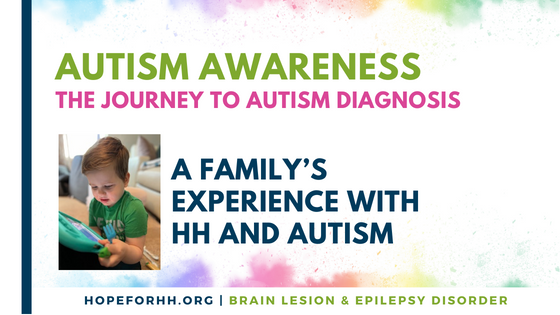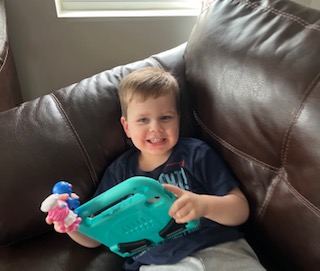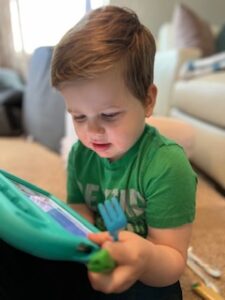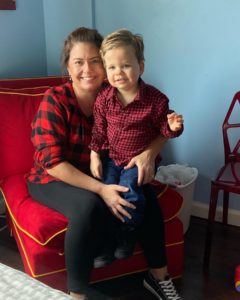
A Family’s Experience with HH and Autism
If you are new to the community, my name is Kristy, and I’m the mom of Brett. Brett was diagnosed with a 2.1 x 2.1 x 1.9 cm Hypothalamic Hamartoma at 10 months old on Saturday, August 15th 2020. He began having Infantile Spasms and we rushed him to a pediatric emergency room. I had written another blog about Brett’s HH medical journey in 2021, however, this one is about his autism journey.
 Before we found Brett’s Hypothalamic Hamartoma tumor, my autism radar was already alerted. However, there was no way to know for sure if it was autism. There’s no blood test to diagnose autism, only a list of characteristics. Time would tell as his skills, or differences developed, as many know that autism isn’t typically diagnosed until around the age of two. Although, I did have a well-trained eye after nearly 16 years of working as a school psychologist. I knew that from 6-12 months, his intense interest in watching ceiling fans went on for far too long, and that his lack of interest in exploring or interacting with any toy was nonexistent and concerning. Brett was always referred to as “an easy” baby by others. His delay in motor skills limited him to remain in one place, and he had no care or concern when I walked away. He was always a happy and content baby, which was somewhat of an early characteristic of autism because what baby never really cries? His state of happiness was somewhat confusing, even to me, when thinking about the criteria for autism. He didn’t seem to lack eye contact or smiles when I initiated interaction with him (this characteristic became more apparent over time). He began receiving early intervention support services around his first birthday, as he just started to crawl and demonstrate the ability to get into and out of a sit on the floor by himself (approximately a six month old skill). Delayed motor skills are a known early characteristic of autism. Yet, his physical therapist and eventually his speech therapists didn’t think that Brett demonstrated signs of autism. I knew. By his first birthday, I knew and just waited for everything to become more pronounced. Slowly more characteristics were coming into play after he turned one.
Before we found Brett’s Hypothalamic Hamartoma tumor, my autism radar was already alerted. However, there was no way to know for sure if it was autism. There’s no blood test to diagnose autism, only a list of characteristics. Time would tell as his skills, or differences developed, as many know that autism isn’t typically diagnosed until around the age of two. Although, I did have a well-trained eye after nearly 16 years of working as a school psychologist. I knew that from 6-12 months, his intense interest in watching ceiling fans went on for far too long, and that his lack of interest in exploring or interacting with any toy was nonexistent and concerning. Brett was always referred to as “an easy” baby by others. His delay in motor skills limited him to remain in one place, and he had no care or concern when I walked away. He was always a happy and content baby, which was somewhat of an early characteristic of autism because what baby never really cries? His state of happiness was somewhat confusing, even to me, when thinking about the criteria for autism. He didn’t seem to lack eye contact or smiles when I initiated interaction with him (this characteristic became more apparent over time). He began receiving early intervention support services around his first birthday, as he just started to crawl and demonstrate the ability to get into and out of a sit on the floor by himself (approximately a six month old skill). Delayed motor skills are a known early characteristic of autism. Yet, his physical therapist and eventually his speech therapists didn’t think that Brett demonstrated signs of autism. I knew. By his first birthday, I knew and just waited for everything to become more pronounced. Slowly more characteristics were coming into play after he turned one.

Brett’s visual fascination with the ceiling fans morphed into a visual fascination with his hands and random toys. Brett’s lack of interest in various toys continued and he proceeded to only have interest in toys with buttons. He still had relatively good eye contact, but it was difficult to maintain his eye contact and gain his interest in most typical ways like singing or playing with bubbles/balloons. He babbled and said some words, but then after a while, we never heard the word again. A new word may have come along, and it eventually disappeared. At eighteen months of age, Brett’s neurologist finally noticed more of a disconnect when trying to obtain his attention during interactions. His eye contact was no longer there, nor his smiles, like they once were for doctors. At 23 months of age, we saw a developmental pediatrician and Brett was officially diagnosed with autism.
Three weeks after Brett’s diagnosis of autism, his tumor was fully resected, and he has been seizure free since. Brett is four and a half years old and continues to have significant global developmental delays. He is considered a minimally speaking, high support needs autistic. Brett understands more of the world than he can demonstrate. For example, he knows different routes to places when we are in the car and communicates that he doesn’t want to go a certain way by saying, “No.” He has a few functional and understandable words, however, he primarily communicates with nonword vocalizations and by leading us to what he needs or wants. He excels in the pool, where he taught himself how to swim at the age of two. Brett attends a special education preschool classroom three times per week, where he receives physical, occupational, and speech therapies. He also participates in a private speech session every other week. Considering his delays and impairments, Brett continues to be happy and resilient! Brett is making continual progress on his own timeline, and we are so proud of him for all that he accomplishes!

Read our previous blogs from our Autism Awareness Series
- First Signs of Autism Spectrum Disorder in an Individual with Hypothalamic Hamartoma Syndrome
- Differential Diagnosis for those with Hypothalamic Hamartoma Syndrome and autistic characteristics
- Overlapping Characteristics of Hypothalamic Hamartoma Syndrome and Autism Spectrum Disorder
- Parenting from Different Points of View
- Coming to terms with a Rare Disease diagnosis and Autism
- Becoming an Advocate
Read more about Kristy and Brett:





